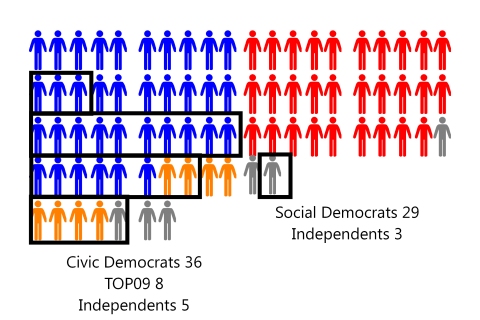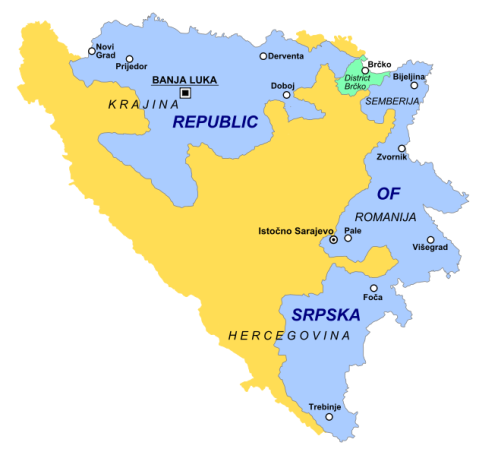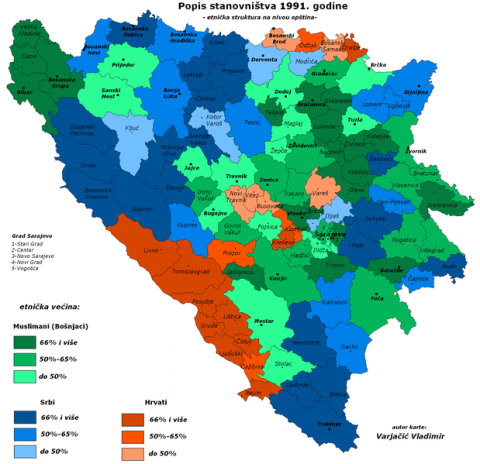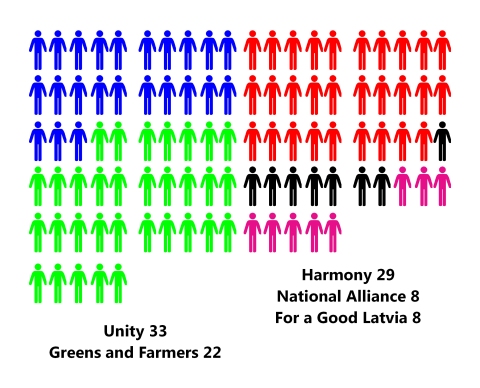Election roundup
October 24, 2010 § 3 Comments
So, a bad weekend for parties in power.
Firstly Bahrain, where 31 of the 40 seats in their lower house were decided in the first round. Shia opposition movement Al Wefaq have already won 18 seats – an improvement of one on their performance last time – but are not part of the remaining nine contests. The other thirteen went to pro-monarchy groups and independents.
This allows for the fascinating possibility of a parliament hostile to the King, as two candidates from the leftist secular liberal National Democratic Action are still in the running. Al Wefaq took a huge risk by openly challenging the authority of the king in the run up to the polls – and now they could potentially have a working majority in Parliament.
However, that would require not only the National Democratic Action to win both their seats, but also to co-operate with Al Wefaq. It is not necessarily guaranteed that they will. The NDA have their roots in the liberal, secular, academic class that have always traditionally had good relations with the monarchy (who they see as the bulwark of a tolerant liberal state) and a slight suspicion of the Islamist political parties. The recent crackdown on dissent, and restriction of freedoms, by the monarchy have further muddied the waters here – and (unlike other secular groups) the NDA are actually not overtly pro-monarchy.
An NDA-Wafaq coalition may well not happen – and if it does it may be largely castrated by the king and his appointed upper house. But, if it did happen, it would provide a fascinating insight into the tense relationship in Arab democracies between the liberals (who are largely outside of parliament) and the Islamists (who largely control parliament) and their sometimes common interest in opposing hereditary power.
Czech Republic
As predicted both here and elsewhere the Czech government did indeed lose its majority in its upper house: and the opposition now has the power to be a right pain-in-the-neck; but not much more. It is still a huge electoral turnaround with all the parties of government receiving a battering at the hands of the left: the governing Civic Democrats won only 8 of their 19 seats up, their right wing coalition allies TOP09 won only 2 of their 6 seats up. With no seats up the Social Democrats picked up 12 and now have an outright majority. The result is
Social Democrats 41 (+12)
Civic Democrats 25 (-11)
TOP09 4 (-4)
Independents 9 (+3)
I believe the Independent seats went to left leaning Communist and similar parties, with the populist Public Affairs and other minor parties who support the government picking up no seats – but I haven’t seen this confirmed anywhere.
Finally world elections have a brilliant article on the changes in Brazil‘s northeast.
Next weekend we have the Ivory Coast – and then on Tuesday it’s the USA. I’ll be putting up a guest post or two about that during the week.
The Czech that didn’t bounce
October 17, 2010 § 2 Comments
One should never take anything for granted in politics. This blog earlier made the error of suggesting that the elections to the Czech Senate were not particularly important. The Senate is the Czech Republic’s second chamber, it has hardly any power, only a third of the senate is up for election, and it would take an earthquake for the ruling centre-Right coalition to lose its majority. The international press scarcely mentioned it, and even the Czech press (or the bits I put google translate to work on) didn’t seem that fussed.
It didn’t quite work out that way.
To recap: in late May of this year the Czech people voted and, after a few months of negotiations, a stable government was formed. It had a majority in both houses, with 118 seats in the 200 seat lower house, and 49 seats in the 81 seat senate. The main party in the coalition was the centre-right liberal Civic Democrats, their junior partner the further right conservative TOP09, their main opponents the centre left Czech Social Democratic Party.
As elections to the Senate are conducted under first past the post (with a runoff) the parties tend to group together into caucuses for the purposes of contesting elections. In the Senate the Civic Democrat led caucus had 36 seats, the TOP09 led caucus 8, and 5 independents or smaller parties were allied to the ruling coalition. The Social Democrats had 29 seats with 3 allied independents or smaller parties.
However, if you look at the seats which were to be contested (inside the boxes above), you could see how the Civic Democrats could lose their majority: 19 Civic Democrat caucus seats were up for election, 6 TOP09 caucus seats, none from the Social Democrats caucus and, of the two independents up for re-election, one sat on either side of the aisle.
Even so, one would expect some sort of bounce from the General Election just passed (this Government was only formed in late June – nearly two months after the UK government – and is only barely out of its first 100 days). Moreover it was thought the main threat came from TOP09. Indeed, in the local elections fought on the same day this was the case and the Civic Democrats lost their flagship leadership of Prague to TOP09. However, in the Senate elections something very different happened.
Firstly, no-one won any seats. Not a single candidate won more than 50% of the vote so every single seat goes to a runoff on Friday and Saturday. This is quite unusual. Secondly, the Civic Democrats did appallingly, and the Social Democrats superbly. The Social Democrats are leading in 22 of the 27 races, and the Civic Democrats have already been knocked out in 8 of the races.
Let us not automatically assume that this will lead to a Social Democrat Senate – the right is more fragmented in the Czech Republic than the left (notwithstanding a sizeable communist vote) and the Civic Democrats could well come back strongly in the second round. Overall the Social Democrats only beat the Civic Democrats in vote share by 1%: receiving 20% to their 19%.
That said, this was a tonking, and the second round election will now be fought against background headlines of “Civic Democrats receive tonking”. The Social Democratic caucus only needs to convert half of its leads to get an outright majority.
So what can the Senate do? Well not much, which is where we came in, but it can repeatedly embarrass the Government by delaying its programme. The Civic Democrats have a radical programme of cuts they want to push through, and it looks like a desire to make it difficult to make those cuts was the deciding factor in this election. The argument of the left is that the Czech Republic has one of the lowest debts in Central Europe – Czech debt is second only in value to German debt on European Sovereign Debt markets – and so Czechs are not as tolerant of deep cuts to public services as, for example, election results would suggest Latvians are.
Let us see what Saturday brings.
In other news the MQM are widely expected to hold onto their seat in the by election in Karachi, but the real news will be the severity of the violence surrounding the poll.
The MQM (the party traditionally associated with Pakistan’s Mohajir community – the descendents of Urdu speaking refugees from central India) dominate Karachi politics but have limited reach outside of the major Sindhi cities of Karachi and Hyderabad. As such they struggle to assert themselves beyond the city limits in elections for the assembly of the province of Sindh. This by-election is for a seat in that assembly and was sparked by the August assassination of prominent MQM politician Raza Haider. The only party that had any chance of taking the seat from them was the ANP (Awami National Party – a party traditionally associated with the Pashtun community, of which there are many expatriates in Karachi), and they are boycotting the polls saying they cannot compete fairly.
Elections in Karachi are often violent affairs, as political divisions match ethnic and sectarian divisions. Up to 25 people have been reported dead already. Let us hope the number gets no higher.
Update: I’m afraid 28 are now confirmed dead in Karachi in a series of gunfire incidents between ANP and MQM supporters. It appears turnout was high and the MQM have easily held the seat.
Election roundup
October 13, 2010 § 2 Comments
As promised, and a little late, here is my roundup of the last few elections.
Bosnia Herzegovenia
Bosnia has a very complicated electoral system, which came out of the Dayton accords at the end of the war – and is designed to give each ethnicity equal influence and build consensus. All the elections are conducted under closed list Sainte-Lague PR – unless there is only one candidate in which case it is first past the post.
Bosnia is divided into two semi autonomous entities – “The Federation of Bosnia and Herzegovenia” which is primarily ethnically Bosnian and Croat and “Republika Sprska” which is primarily ethnically Serb. The mixed district of Brcko is formally part of both, and has a degree of autonomy.
Both halves elect their own national assembly. In addition they together elect a House of Representatives for Bosnia and Herzegovenia – which is the lower hose of the federal government. The upper house is called the House of the Peoples, and is elected by the houses of the two halves. It has 15 members: 5 Bosnian, 5 Serb, and 5 Croat and its job is to make sure that no law can be passed unless all three ethnic groups agree to it.
The much repeated quote about “13 Prime Ministers, 14 constitutions, 14 parliaments, 14 legal systems” etc… is a little misleading – not that the system isn’t complicated enough. You can get to these numbers if you look at the powerfully autonomous regional government but the Prime Ministers do not have any real power. The quote comes from Bosnia’s Ambassador to the USA Miroslav Lajack, in the course of a speech about how unwieldy the system was.
He also said there were 5 presidents – a figure he arrived at by including the leaders of the two constituent halves. In actual fact executive power is vested in 3 presidents – one from each of the three ethnic groups. Voters in the Federation of Bosnia and Herzegovenia get to choose whether they want to vote for the Croat or the Bosnian President, whilst Republika Sprska elects the Serb president. The president who receives the most votes becomes chair of the presidential council and so has a little more power, but the idea is the three presidents move forward by consensus. In addition there are a great deal of checks and balances from the legislative – who have various veto powers – and any constituent half of the country can block any change proposed by the other half.
There is not yet any evidence that the Federation half are tactically choosing to vote in one election rather than the other in order to gain more votes for one candidate over the Repubica half.
The results
The results were mixed. In the main, the Bosnian parts chose conciliatory pluralist candidates whilst the Serbian and Croat parts chose hard-line nationalist. This fits in with various analysts’ views that opinions in Republica Sprska are hardening, and there is an increasing appetite to split from the Federation. However this hides a lot of the detail in the results – there were pro-moderate moves amongst Serbs and Croats too, but the nationalists grabbed the headlines.
Firstly the presidency. The Serbs re-elected hard-line pro secession Nebojsa Radmanovic. The Croats re-elected the moderate Zeljko Komsic, and as he got the most votes overall he will chair the presidential council. In the biggest surprise of the night, moderate Bakir Izetbegovic beat hard-line incumbent Haris Silajdzic for the Bosnian presidency.
Meanwhile seats in the executive seem to have not been finalised yet (update, they now have and are available on the Bosnia page). However it seems that in Republica Sprska, and for the Serbian seats, hard line virulent nationalist separatist Milorad Dodik and his SNSD were re-elected, but with a considerably reduced majority. The Croats largely seem to have voted for the nationalist Croat Democratic Union. Meanwhile amongst Bosnians the compromise Party for Democratic Action kept their top spot but there was a dramatic improvement for the multi-racial radically compromising Social Democrats – they may well have also received a fair few votes from Croats and Serbs living in Bosnian areas.
For all the hand wringing, the result is broadly a continuation of the status-quo – if not slightly better. At every level of every government there are a mixture of hardliners and moderates who are now going to have to work together – but that was the case before. There is a problem with militant Serb nationalism in Republica Sprska – but we knew that before Sunday week.
The real problem as I see it is not that Bosnia is so divided politically, but that it is so divided socially and culturally. These sobering demographic maps show just how ethnically mixed Bosnia was in 1991, and how segregated it was by 2006:
Latvia
Latvia is thankfully more straight forward. A 100 seats are elected by Sainte-Laguë PR to their one parliament which elects one Prime Minister. Previously the centre-right parties had been ruling in a coalition with the help of green and farmers’ parties. Prior to these elections the centre right formalised their coalition into an alliance known as Unity whilst the centre-left went a step further and merged into a political party known as Harmony. The Greens and Farmers (note: whilst still Greens, Latvian Greens are considered centre-right, the party largely consisting of conservative agrarians) also formalised their alliance into a coalition, which they called the Union of Greens and Farmers, displaying the kind of creative originality for which farmers are famed. Meanwhile the far right was more fragmented – eventually clumping together into two alliances: “For a Good Latvia” and “The National Alliance”.
These coalitions were all broadly successful; all benefiting from their alliances to pick up a clutch more seats. The exception was the far right who were virtually obliterated – losing 25 seats (a quarter of parliament). The result is a continuation of the status quo – the centre right propped up by the Greens and Farmers – but with the previously powerful far right now a political irrelevance and excluded. The centre-left could form a government with the Greens and Farmers if the latter agreed – they won’t yet, but it could be a useful bargaining chip in the years to come:
Czech Republic
I promised you a look forward to Friday’s election in the Czech Republic, which makes me look silly. The elections were held early in March of this year – nothing is happening on Friday. The next elections are on October 23rd in Bahrain. They are going ahead – there’s already some stuff about it on my Bahrain page.
In the meantime enjoy every election campaign ad of the US mid terms so far.
Update: I now look even sillier: there are some limited elections in the Czech Republic this weekend but they don’t mean much. They are for the first round of the elections of a third of the largely powerless upper house. See the comments for more details.




